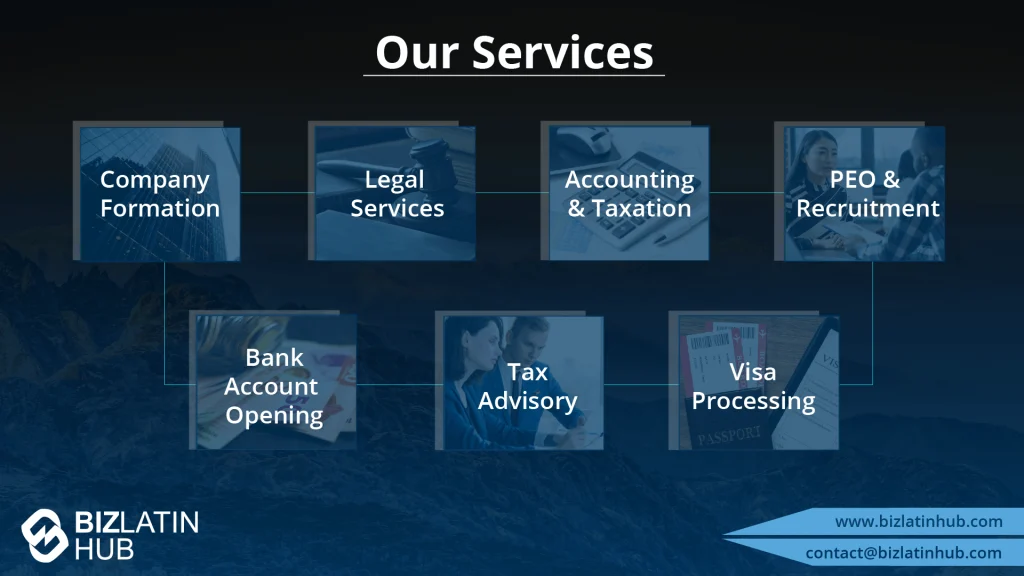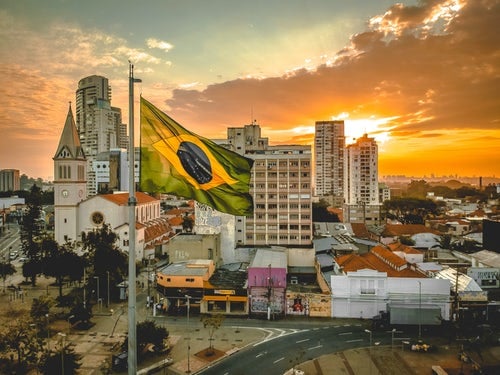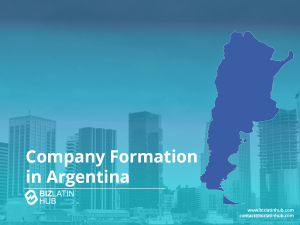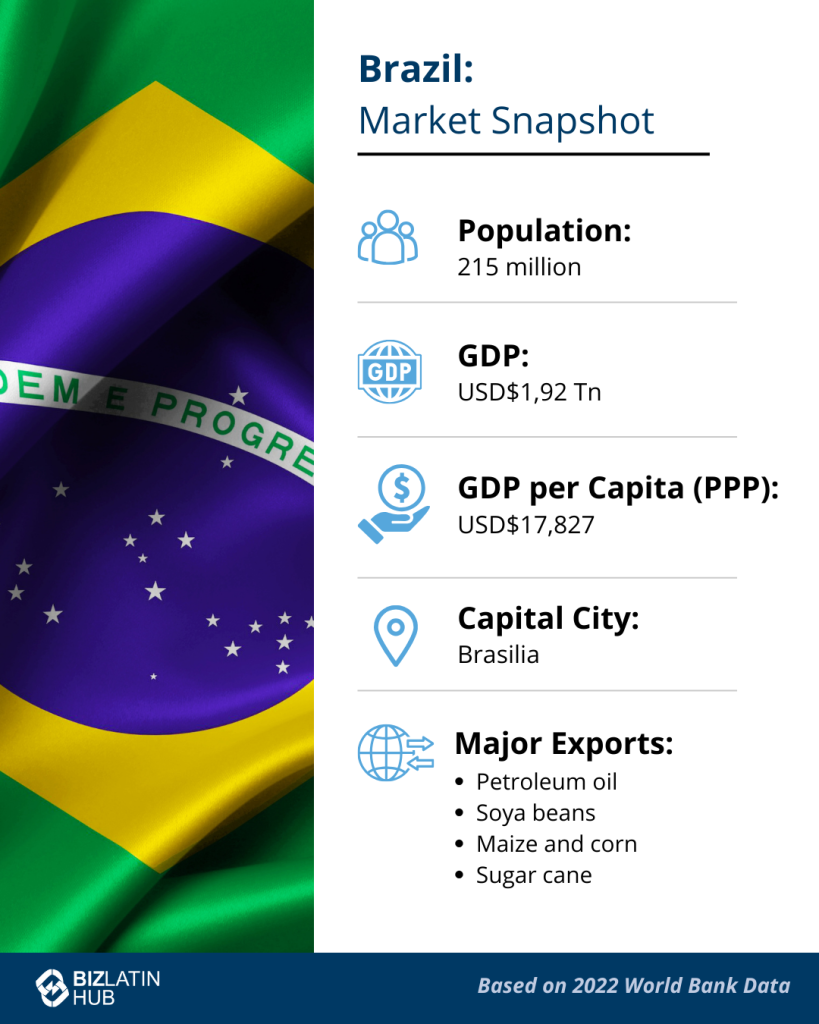
If you have valuable IP, you will need to register a trademark in Brazil to protect your brand and secure your company’s reputation in the country. Registering a trademark in Brazil is a crucial step business must undertake to establish their brand and protect their intellectual property in this vast and promising market.
If you are considering expanding into the country, for example through LLC formation in Brazil, it is a key part of the process. It will deter competitors from using a similar mark, preserving your market share and ensuring customer loyalty. Registering a trademark in Brazil opens the door to a market of over 200 million people, making it a strategic move for expansion.
Furthermore, it is relatively straightforward to register a trademark in Brazil, with well-defined procedures and regulations in place to safeguard your brand. However, it still makes sense to consult local specialists such as Biz Latin Hub in order to make sure the process goes as smoothly and quickly as possible.
In summary, registering a trademark in Brazil is a prudent and strategic decision for businesses aiming to establish a strong presence, protect their brand, and access a vast consumer base in this thriving South American country.
Businesses operating commercially in any country will desire to protect their brand and creative energy.
In this article, we touch upon some key aspects to consider when registering a trademark in Brazil.
Where to register a trademark in Brazil
The governmental institution in charge of registering trademarks and granting patents is the National Institute of Industrial Property (Instituto Nacional da Propriedade Industrial, INPI).
INPI protects your trademark in Brazil, giving the trademark validity for a period of 10 years. This period can be extended for the same amount of time with no limit.
How are trademarks defined in Brazil?
To register your trademark in Brazil, you must understand and comply with the Industrial Property Law.
- A trademark can only be registered in Brazil if it is directly relevant to the business nature or commercial activities of your company. For foreign entities, it is necessary to have a legal representative in-country to undertake the trademark registration process.
- Before proceeding with the registration process, it is recommended that you consult the list of prohibited items that can’t be registered. Article 124 of the Brazilian industrial property law outlines this list of prohibited items.
- After confirming that you can register the trademark, you must then confirm that it is available by conducting a trademark search in Brazil’s national database. You can check trademark availability on INPI’s database. Although this step is not mandatory, it is strongly recommended as it may affect the evaluation of your petition.
- The trademark search in Brazil doesn’t take long and will ensure that the elements you want to protect are unique, and that they won’t be competing with others with similar characteristics.
- Once you are sure that your trademark is available and that it is compatible with your product or service, you must determine the nature of the trademark. To register a trademark it is important to make a detailed description. The nature of your trademark can include a mixture of characteristics. Consult an expert to help you determine the exact nature of your product or service.
Brazil classifies trademarks in the following way:
- Scope of protection: Product or service
- An object of protection: Collective or certification
- According to its graphical representation: nominative, mixed, figurative or three-dimensional
It is of the utmost importance to have an exact notion of the type of trademark you want, as this determines the type of protection it will receive. Make sure to act quickly once you know what trademark you want to protect. The first application to be received by INPI has priority over applications submitted afterward.
How is the renewal process for a trademark in Brazil?
Here are 5 things to consider before the process of renewing a trademark in Brazil:
- Periodic declarations of use are not required
- Third parties may attack a registered trademark on the basis of non-use
- The first renewal date of your trademark will be 10 years after the date of approval of the registration
- Subsequent renewals last for 10 years from the date of renewal of the registration
- The grace period after the expiration of the renewal date is 6 months
4 Steps to register a trademark in Brazil
You can register your trademark in Brazil over the internet or in person by following this process:
- Step 1 – Register your trademark over the internet.
- Step 2 – Apply for your trademark over GRU.
- Step 3 – In-person process to register your trademark in Brazil.
- Step 4 – Evaluation process.
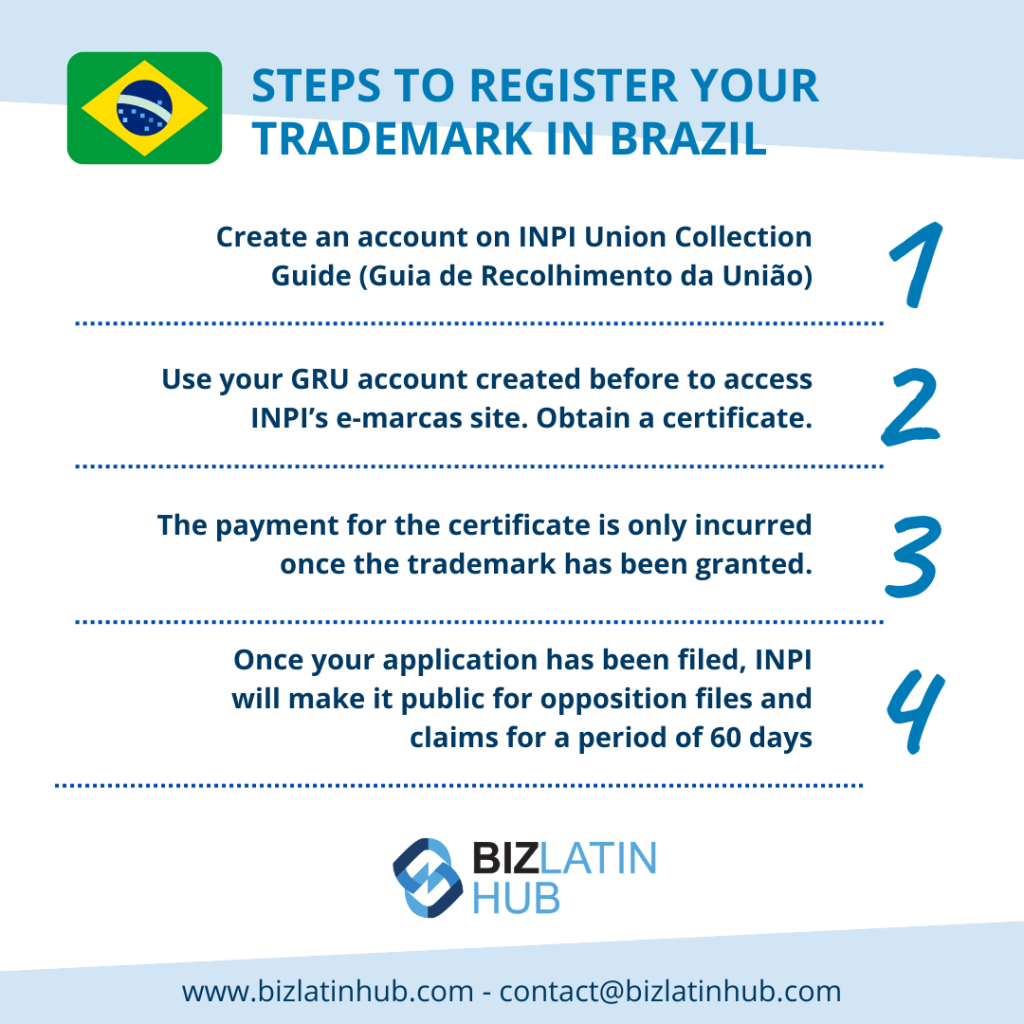
1. Register Your Trademark Over the Internet
To register your trademark online, you will need to create an account on INPI’ Union Collection Guide (Guia de Recolhimento da União, GRU).
There are two links to register an account in GRU, one for applications handled by legal representatives and the other for individuals who are handling the applications themselves. Be mindful that foreign entities must have a legal representative.
Once registered in GRU, you must issue and pay the Union Collection Guide (GRU). Don’t forget to keep your assigned number of GRU, as it will be necessary for later steps.
2. Apply for your trademark over GRU
Next, you must submit an online form. Use your GRU account created earlier to access INPI’s e-marcas site. This is the electronic system used to register a trademark. There you will be able to fill and submit an electronic form. It will ask for the following:
- General information about your trademark and the business application form
- GRU payment receipt
- A digital image (if applicable)
- The power of attorney (if applicable)
- Regulation on use and other documents to support your application
Once your application is approved, you can proceed to obtain a certificate. The approximate fee for the GRU and the trademark certificate of 10-year validity is approximately USD$372.50.
3. In-person process to register your trademark in Brazil
At INPI, fill out and submit the application form and pay the respective fee. The information to submit is similar to that of the online application.
The overall calculated fee for the in-person process to register your trademark in Brazil is USD$432.29. This includes the payment for the certificate if the trademark is granted. The payment for the certificate is only incurred once the trademark has been granted.
4. Evaluation process
Once your application has been filed, INPI will make it public for opposition files and claims for a period of 60 days. If there is no claim, examiners will check INPI’s database to confirm that there are no conflicts with other registered trademarks. If an opposition is filed, applicants should respond within 60 days.
When the evaluation concludes a decision will be issued, track your application on INPI’s website and check the IP magazine.
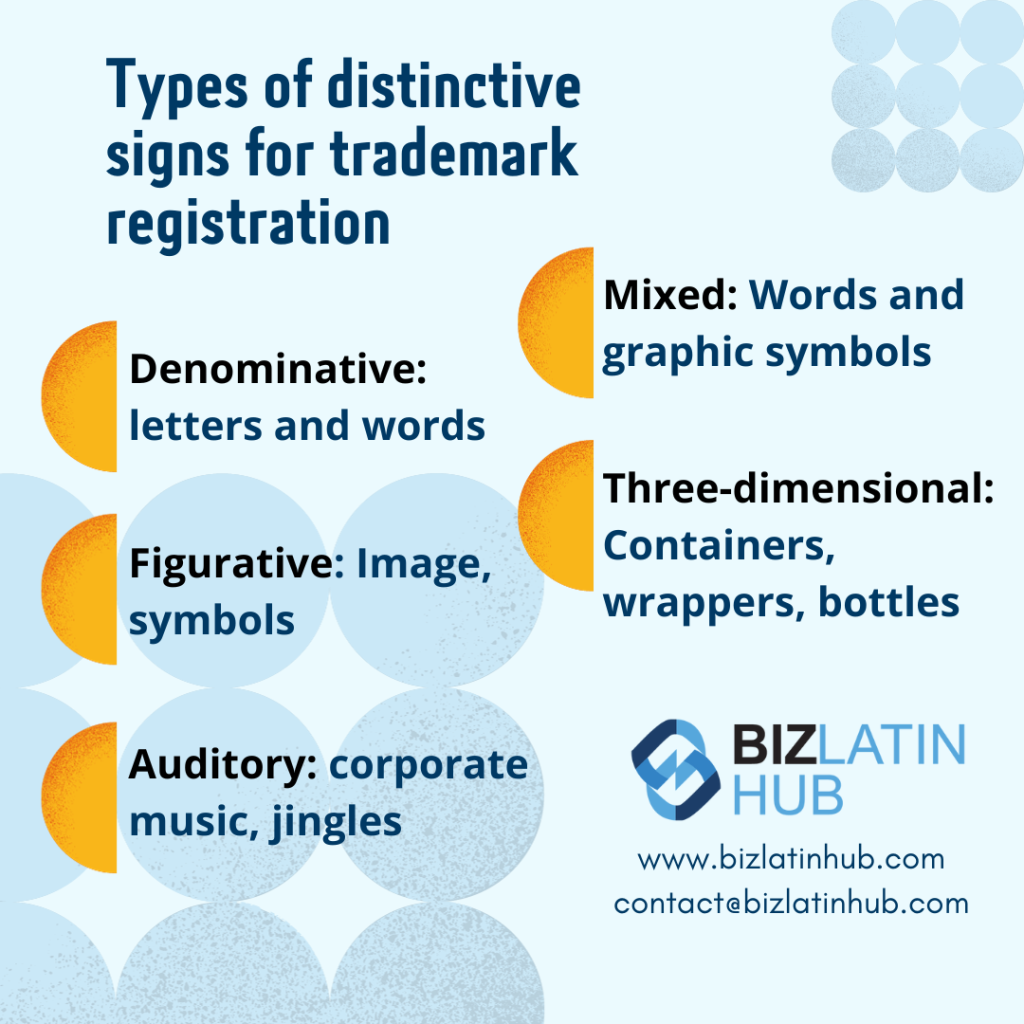
Brazil is a Member of WIPO
The World Intellectual Property Organization (WIPO) works to increase respect for intellectual property internationally. Brazil joined WIPO’s International Trademark System in July of 2019 through the Madrid Protocol. The Madrid protocol facilitates Brazilian trademark protection in international markets.
This system entered into force this year and covers 80% of world trade. Exporters seeking to protect their brands can do so more easily in countries registered under the Madrid Protocol. To protect a brand internationally using the Madrid Protocol, interested individuals can submit an application once they have already registered their brand in Brazil. This application should be submitted to INPI and they will forward it to WIPO for evaluation.
FAQs on trademark registration in Brazil
Based on our extensive experience these are some common questions from clients who are registering a trademark.
1. How much does it cost to register a trademark in Brazil?
The approximate fee for the GRU and the trademark certificate of 10-year validity is approximately USD$372.50.
2. What are the requirements to register a trademark in Brazil?
- The Applicant’s Contact Information (Business name, business ID number, country of incorporation, phone number, office address, email address, etc.).
- Determine the class of your products/services to be registered in the International (Nice) Classification of Goods and Services.
- A detailed description of the brand, its origin, design, general description, and business activity.
- The date at which you commenced using your brand commercially.
- If you wish to register your logo along with your brand, we request that you provide the logo in JPG format.
3. How long does it take to register a trademark in Brazil?
The timeframe to register a trademark is 12 months, provided there is no opposition from third parties.
4. What are the steps to register a trademark in Brazil?
- Step 1 – Register your trademark over the internet.
- Step 2 – Apply for your trademark over GRU.
- Step 3 – In-person process to register your trademark in Brazil.
- Step 4 – Evaluation process.
5. What happens if my trademark application is rejected?
If your trademark application is facing a rejection by the registry, most likely there is an existing trademark sharing designs, names or others.
6. Can I renew my trademark indefinitely in Brazil?
Trademark renewals in Brazil are subject to periodic deadlines, normally every ten years. However, failure to renew within the stipulated period may result in the loss of trademark protection.
7. What is a trademark search in Brazil?
A trademark search in Brazil is undertaken to confirm within the chosen jurisdiction the commercial existence of the name in use.
Register a trademark in Brazil with Biz Latin Hub
Entering the Brazilian market is exciting, but challenging. The country is open to innovation and offers great potential due to its vast population and economic reforms. However, there is still a complex bureaucratic system that market entrants must navigate, and it helps to have an expert on hand.
To register your trademark in Brazil, find a trusted legal representative to guide you through the steps and required documentation. Your legal partner must have an in-depth understanding of Brazilian legislation to assist you with your trademark search in Brazil, and the subsequent registration process.
At Biz Latin Hub, we have experienced local lawyers with vast experience helping businesses with company formation, legal representation, hiring services, and more. We are experienced in supporting new and established businesses to apply for and obtain the trademarks they need to secure their brand and revenue.
For more information about how we can help, contact us now and get started.
Learn more about our team and expert authors.
